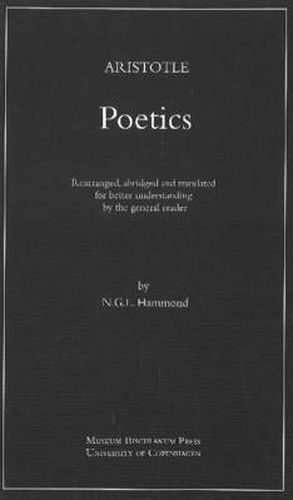Readings Newsletter
Become a Readings Member to make your shopping experience even easier.
Sign in or sign up for free!
You’re not far away from qualifying for FREE standard shipping within Australia
You’ve qualified for FREE standard shipping within Australia
The cart is loading…






In many fields of knowledge Aristotle was and is today an outstanding figure. He possessed the acutest powers of observation and analysis, and he applied the systematic method of definition and classification to the study of biology, physics, logic, ethics, metaphysics and literature. His writings, however, at least in the form in which they have come down to us, are far from systematic in arrangement and far from clear in exposition. The discrepancy between his scientific method and his literary manner is probably to be explained on the hypothesis that the notes, on which his lectures at the Academy were based, were published in the form in which they were found after his death. The Poetics is a case in point. The arrangement of the argument is often haphazard. For example, a technical term is frequently used in one chapter and defined in a subsequent chapter; literary forms, such as tragedy and epic, are distinguished from one another, but the treatment of them is intermingled; and the summary of contents does not correspond in order to the unfolding of the argument. In consequence, the treatise is often confusing to the scholar and to the layman. In this version the text has been so rearranged that it makes the argument clear. The style of Aristotle is direct, concise and close to the ordinary speech of his day. The style of the translation by professor Hammond is intended to be similar. Aristotle’s method of exposition is marked in detail by some idioms of connection and arrangement which are alien to us. In the translation these idioms of exposition have been abandoned, and the normal practice of our day has been adopted.
$9.00 standard shipping within Australia
FREE standard shipping within Australia for orders over $100.00
Express & International shipping calculated at checkout
In many fields of knowledge Aristotle was and is today an outstanding figure. He possessed the acutest powers of observation and analysis, and he applied the systematic method of definition and classification to the study of biology, physics, logic, ethics, metaphysics and literature. His writings, however, at least in the form in which they have come down to us, are far from systematic in arrangement and far from clear in exposition. The discrepancy between his scientific method and his literary manner is probably to be explained on the hypothesis that the notes, on which his lectures at the Academy were based, were published in the form in which they were found after his death. The Poetics is a case in point. The arrangement of the argument is often haphazard. For example, a technical term is frequently used in one chapter and defined in a subsequent chapter; literary forms, such as tragedy and epic, are distinguished from one another, but the treatment of them is intermingled; and the summary of contents does not correspond in order to the unfolding of the argument. In consequence, the treatise is often confusing to the scholar and to the layman. In this version the text has been so rearranged that it makes the argument clear. The style of Aristotle is direct, concise and close to the ordinary speech of his day. The style of the translation by professor Hammond is intended to be similar. Aristotle’s method of exposition is marked in detail by some idioms of connection and arrangement which are alien to us. In the translation these idioms of exposition have been abandoned, and the normal practice of our day has been adopted.